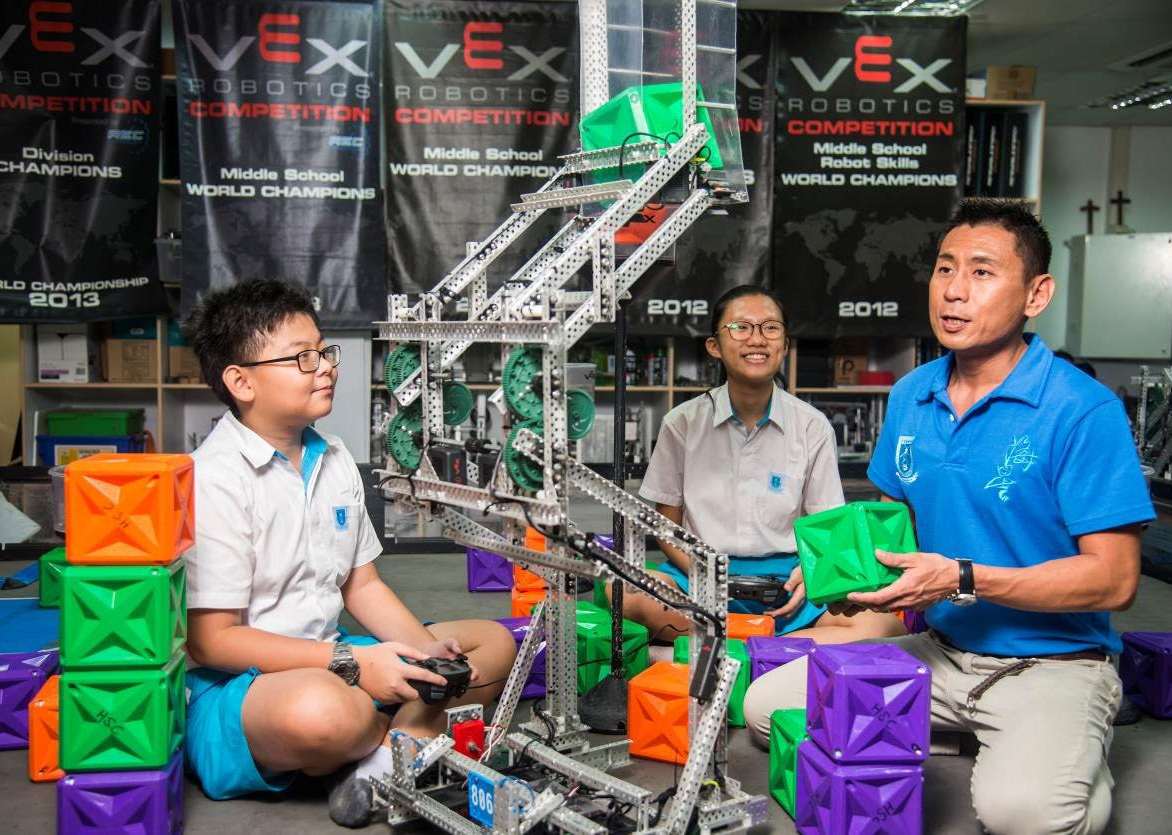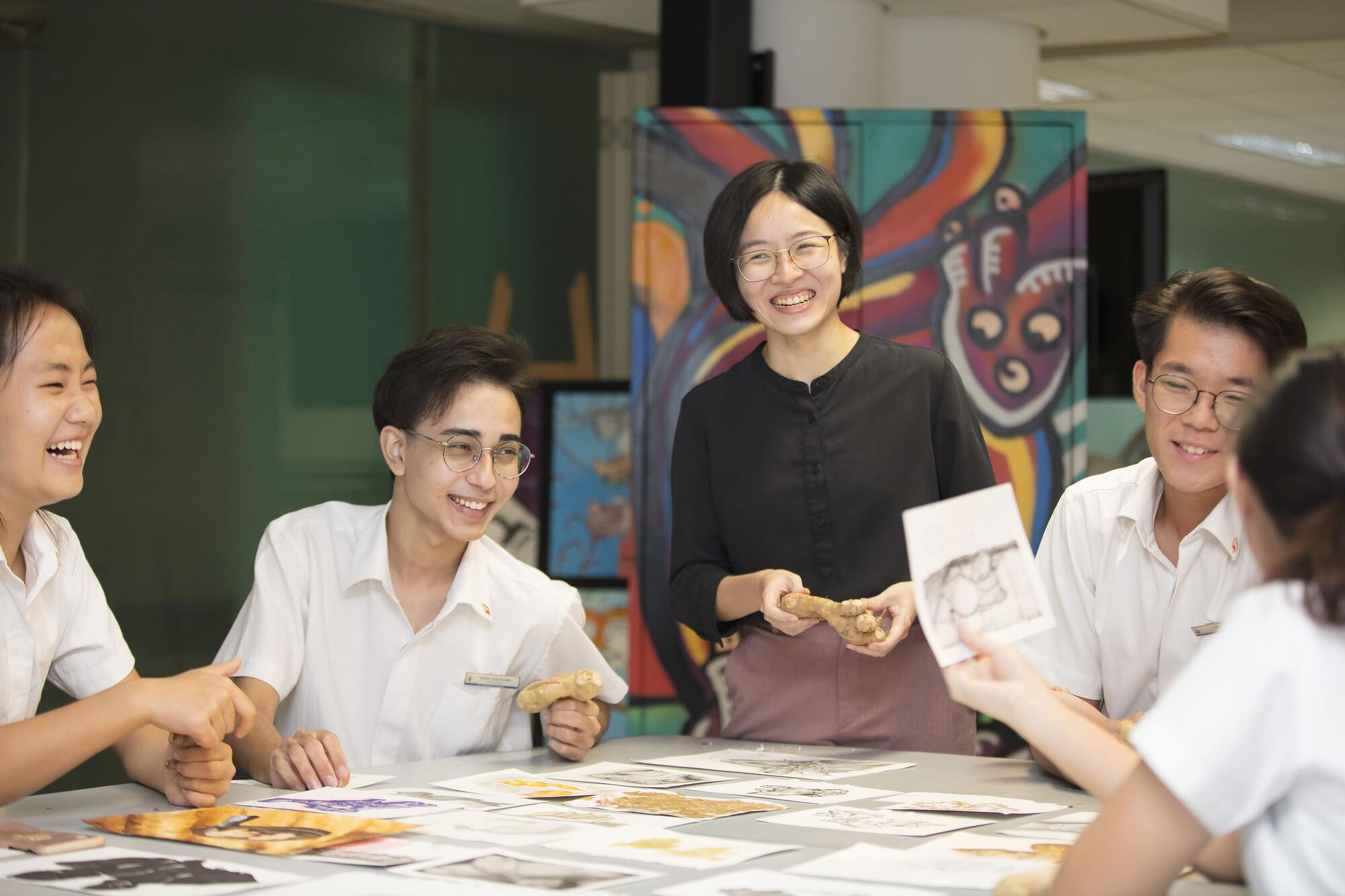Mr Frankie Leow Wee Meng, Bedok Green Secondary, President’s Award for Teachers 2020 Finalist
The painstaking process of finding a tiny coding error in a massive computer programme wasn’t originally part of the curriculum of Computer Applications classes. But Frankie Leow, a Science and Computer Applications teacher at Bedok Green Secondary School, felt it should be.
“By allowing students to debug buggy animations and games, they learn to be resilient and not give up when faced with difficulties. They use [specific] strategies to problem-solve,” he said.
“Debugging is an important aspect of computational thinking and, in turn, can be a life skill.”
Programmes reflect real life
Frankie has been championing its teaching in Bedok Green Secondary School since 2017. He does this by handing out “assignments” (an animation code or a game code) with deliberate errors.
Then he gives students strategies. For instance, students can talk out the issue to a rubber duck (or a classmate). This is called rubber duck debugging, which allows students to say out loud what they are thinking about the problems in the computer script and their solutions. This helps to sharpen their thinking.
Then there’s the wolf fence debugging, where students try to find the tiny mistake by “slicing” the programme into halves – you run little tests in the first half and if the error isn’t there, you then take the next half, and halve it again. Until you find it.
These are names and methods used by professional coders.
Frankie is pleased to report that his students are taking well to them, like “non-rubber” ducks to water.
“Some of our students tended to give up easily. They found programming very difficult, very complex. We want to show them that debugging is not as complicated as it seems and programming is just another language – it’s not so intimidating.” This has resulted in students attempting to debug their Scratch program language products – simple animations and games – before they seek help from teachers. This makes them self-directed learners as they not only identify their mistakes but fix them, too.
Spreading the enthusiasm
Frankie has also been spreading his debugging mantra in the fraternity: With a group of curriculum designers, he came up with the “Teaching Debugging Explicitly” project that turned into an annual workshop for teachers. There, they present strategies and share resources to promote the learning of debugging strategies across schools. After receiving feedback, this is now a teacher-led Workshop – Script it Right – Debugging made easy.
In recognition of his ongoing drive to shape the computing education landscape, Frankie became one of only two teachers in Singapore to receive the Outstanding Computing Teacher Award (OCTA) from the Infocomm Media Development Authority in 2018.
This led to his invitation to the International Conference on Computational Thinking Education held in Hong Kong in June 2019. “There, I was reminded that programming and computational thinking should be both inclusive and sustainable,” he said.
“Programming shouldn’t…privilege a certain group of people. It should be as inclusive as possible so that everybody has access to learn and to flourish. It must be sustainable, meaning…the kids must [be] able to apply and transfer [the learning] in new situations beyond school, in their lives.”
Everyone, everywhere can do it…
Inclusivity is not new for Frankie. He designs different assignments to cater to the learning needs of his Normal stream class.
“We set differentiated group tasks – students are given the choice to present their learning in the form of write-ups, photo essays or video clips. In this way, we expose them to technology, teamwork, fact-finding and the reality of deadlines.”
Confident of his students’ abilities, Frankie is always looking out for suitable competitions which his students can participate in. “I believe in the students and their abilities. I want to take their learning experience to another level, where they can see they are as good as others.”
He has been proven right.
Teams from Bedok Green have enjoyed success for two years running at the IgnITE Skills Challenge, a national skills competition organised by the Institute of Technical Education (ITE), with the support of the Ministry of Education (MOE).
In 2018, out of five teams which entered the final stage, one was placed 2nd and another 3rd. The school’s showing in 2019 was even better – three teams were placed first and two came in third.
Helping them help their friends
Another approach that Frankie takes towards his students who fall behind is one-on-one counselling and mentoring, and spending time with them to identify underlying issues – especially for at-risk students. But he also challenges them to stretch their abilities – with structured support, of course.
Even simple things help. “For instance, my students, who have special educational needs or are struggling, take turns to grow and nurture the class plants and present their findings to the class. This builds confidence and creates opportunities to work with others.”
To create a strong network of support for students, Frankie conducts Student Peer Support (SPS) training, so students have practical strategies they can use to support those who may need help. He also initiated the Circle of Friends programme for select classes to extend such peer support efforts.
How does this all work? For instance, he had a student who was prone to emotional outbursts, which often resulted in disruption to lessons. Frankie appointed a peer support group in the class to rally around this student. The group, among other things, actively looked out for tell-tale signs that usually preceded a meltdown, so that the teachers could be alerted immediately. The group also helped seek permission on behalf of the student for her to step out of the class to regulate her emotions. All this helped to minimise class disruptions.
Education in action
Another area of passion for Frankie is in sustainable learning.
“Students need to know that skills they learn in school can sustain them when they go out to work. Even if they do not go into IT after graduation, what they have learnt in their Computer Applications class – such as word processing, presentation, data analysis and logical thinking – can serve them in other fields.”
Frankie’s way of showing the students this is the annual Shooting Stars event. Based on a funfair concept, it has become a highlight of the Bedok Green calendar since its inauguration in 2010.
Students, in groups of four, set up booths selling their products and services – from displaying computer animations or games to showing how crystals are grown, and even dismantling and re-assembling computers (this is a hot attraction). The proceeds go to the school’s funds to assist students who need extra help.
Along the way, students use skills learnt across subjects – Computer Application, Maths, Science, English, Design and Technology (D&T) and Food and Consumer Education (FCE). For instance, word processing to create flyers… public speaking to advertise their booths… showing profits using spreadsheets… and they design products using their D&T and FCE knowledge.
“This allows students to see relevance and meaning in what they are learning in a way that is authentic to their everyday life experiences.”






